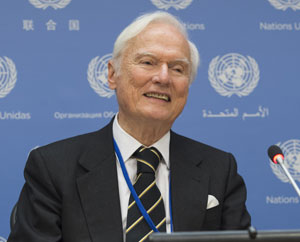The Upcoming Generations Can Lift the Arab Region out of Its Current Crisis
GENEVA, Feb 05 (IPS) - History testifies that there is no end to its evolution despite what some have claimed. This is because aspirations of its actors are in constant flux and because the quest for an « ideal city » is asymptotic.
Each generation wants to put its imprint on the present and to be the architect of its future in the pursuit of its own ideal.

The generations of the XXth century in the Arab region availed themselves of this opportunity through their struggle for the restoration of their dignity predicated on recovery of their nation's sovereignty. This had an immediate effect on improving their condition at the time. They then set about charting the future society they aspired to and where equality would hopefully prevail. The spirit of the times was that such equality could best be pursued by socialist ideologies whether of the secular kind as pursued in part of the Middle East or blended with a statist concept of faith as was the case in other parts of the MiddleEast and in parts of North Africa. The effectiveness of these ideologies rested on an all-encompassing view of society which became co-terminous with the nation-state.
The nation-state is a modern concept on which contemporary advanced countries have built their identity as development contributed to the obsolescence of more narrow concepts of allegiance. While this was a more or less irreversible internal evolution in the global North, it was not necessarily so in the Arab region where tribal or regional allegiances remained vibrant though contained by what remained an exogenous socialist ideology. Commitment to the latter was narrowly related for newly liberated countries to patriotic anti-colonialism.
With the collapse of the Berlin Wall in 1989 and of the Communist ideology which nurtured state socialism in the Arab region, the new generations there found themselves deprived of the cementing effect of a nation centralised through statism.
So the younger generations which now represent about two-thirds of the total population of the region are spurred by two factors :
First, they do not consider like their forebears that their quest for dignity is nurtured by thirst for sovereignty as the latter is already a given. These cohorts consider that the search for dignity must henceforth be nurtured by participation in decision-making and by promoting a culture of accountability in the field of human rights rather than one of compliance. So the search for dignity which for their elders was turned outwards is pursued by the younger generation why turning inwards. For the former, perceived dignity deficits led them to vent their anger outwards. For the latter, it lead them to vent it inwards. In the « digital era », social media and their borderless manipulation amplify this phenomenon. The elder and the younger generations remain bound however by a shared opposition to foreign invasion which compounds their anger
Second, as the statist pillars of nationhood that were exogenously inspired became more brittle following the weakening of the Communist ideology worldwide, the youth in the Arab region were and still are at a loss to find an alternative cementing ideal for the nation whose unity has been built in advanced countries through an indigenous maturing process of national preeminence.
Hence anger amongst the youth is coupled with a perceived and probably excessive sense of powerlessness which leads it to become detached from current affairs or to seek refuge in a community of faith rather than one based just on the nation. To a considerable extent, the lack of a perceived long term ideal for the future led the youth also to excavate one from the pre-colonial past i.e. the euphoric vision of an Islamic nation (that by all accounts never really existed) . Alternatively the loss of a societal compass is leading to re-activating sub-identities at the regional, local or tribal levels.
As in all social movements, there are aberrant individuals or groupings which exploit anger and frustration to pursue self-serving objectives of accessing power through violence in one case or through undermining national unity in the other.
That youth anger can thus be taken advantage of in the digital era gives a measure of its loss of momentum in the search for a common ideal. This explains why the Arab commotion called « Arab spring »was hardly more than social spasms generated by anger but deprived of a credible ideal for the longer term.
The ideal that can really mobilize the youth may be one based on the promotion of equal citizenship rights for all. This rights-based leitmotif is advocated by all the major world religions, creeds and value-systems. It is applicable for believers and non believers alike and works for unity of purpose at the national and at the international level. It will ultimately make irrelevant or obsolete the marginalizing and even oppressive connotations of concepts of ethnic, religious or gender minorities. It will cloak all individuals in a nation with the same right to dignity. Indeed the concept of minorities will seamlessly yield to that of social components of diversity in unity.
And ultimately equal citizenship rights is the gateway to peace as proclaimed at the World Conference held at the UN in Geneva on 25 June 2018 on Religions, Creeds and Value Systems joining Forces to Promote Equal Citizenship Rights under the patronage of HRH Prince Hassan of the Hashemite Kingdom of Jordan
Idriss Jazairy - Former Ambassador, Executive Director of the Geneva Centre on Human Rights Advancement and Global Dialogue, an NGO think-tank in consultative status with the UN.
© Inter Press Service (2019) — All Rights Reserved. Original source: Inter Press Service

